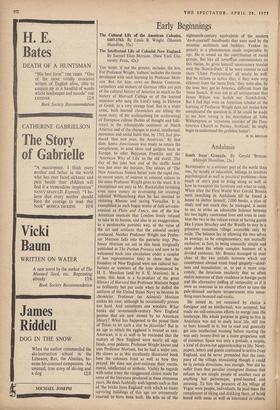Early Beginnings
THE wider, if not the greater, includes the less. For Professor Wright, 'culture' includes the theme developed with such learning by Professor Mori- son. But, for him, cows on Boston Common, carpenters and makers of German rifles are part of the cultural history of America as much as the history of Harvard College or of the learned ministers who sang the Lord's song, in Hebrew or Greek, in a very strange land. But in a wider sense, both learned chroniclers are telling the same story, of the acclimatising (or acclimating) of European culture (habits of thought and folk- ways) in the inhospitable continent of North America and of the changes in moral, intellectual, economic and social habit that, by 1763, had pro- duced 'that new man, the American.' By that date, homo Anzericanus was ready to return the compliment, to send ideas and gadgets back to Europe, to offer Benjamin Franklin and the 'American Way of Life' to the old world. The day of the juke box and of the skiffie band was just over the horizon. The editors of 'The New American Nation Series' note the rapid rise, in recent years, of interest in colonial culture in the sense Professor Wright gives to the word. It is exemplified not only in Mr. Rockefeller lavishing even more money in re-creating (or creating) colonial Williamsburg than he has devoted to restoring Rheims and saving Versailles. It is exemplified M such bogus works of folk-art-cum- musical as Plain and Fancy, one of the few American musicals that London firmly refused to take to its bosom, and also in an exaggeration, in a pardonable patriotic way, of the value of the art and artifacts that the colonial society produced. Neither Professor Wright nor Profes- sor Morison falls into the patriotic trap. Pro- fessor Morison set out in this book (originally , published as The Puritan Pronaos and now to be welcomed back into circulation under a simpler if less representative title) to show that the founders of New England were not cultural bar- barians or wowsers of the type denounced by H. L. Mencken (an'd by S. E. Morison). In a sense, this book is a by-product of the great History Of Harvard that Professor Morison began so brilliantly but put aside when he doffed the uniform of the United States Navy to become its chronicler. Professor (or Admiral) Morison makes his case, although he occasionally presses too hard. And sometimes one wonders. What books did seventeenth-century New England possess that are now owned by no American library? What has happened to the proud State of Texas to let such a slur be plausible? But in an age in which the egghead is treated as anti- American, it is as well to be reminded that the makers of New England were nearly all egg- heads, even pedants. Professor Wright knows and uses Professor Morison, but he had a wider aim. He shows us in this excellently illustrated book how the colonists lived as well as how they prayed. He does not over-estimate their merits, moral, intellectual or esthetic. Visibly he regards with some irony the exaggerated claims made for some of the literature produced in these strenuous years. He deals faithfully with legends such as that of 'the bricks from England' with which so many surviving buildings of this age are erroneously asserted to have been built. He tells us of the eighteenth-century equivalents of the modern 'do-it-yourself' handbooks that were used by the amateur architects and builders. Yankee in- genuity is a phenomenon made respectable by age. He is sound on the contribution of racial groups. But like all AmerrCan commentators on this theme, he gives himself unnecessary trouble over the 'Scotch-Irish.' If he were content to call them 'Ulster Presbyterians' all would be well. But he refuses to notice that, if they were very different from the 'mere Irish,' they were also, by the time they got to America, different from the 'mere Scotch.' It was not at all unimportant that James Wilson was Scotch not 'Scotch-Irish.' But I feel that even an American scholar of the learning of Professor Wright does not realise how complicated the question is. If he could be made to see how wrong is his description of John Witherspoon as 'sometime minister of the Pres- byterian Church in Paisley, Scotland,' he might begin to understand the probltm better!
D. W. BROGAN






























 Previous page
Previous page